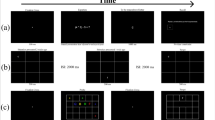Abstract
An important issue in our understanding of cholinergic modulation of information processing is the extent to which drug-induced changes affect memory processes per se or simply the attentional processes required for effective acquisition of information. In this study, we examined the separate and combined effects of scopolamine and nicotine on verbal free recall. A single dose of nicotine improved recall performance on supraspan lists (30 words), but not on short lists (10 words). The same dose of nicotine had no effect on the scopolamine-induced recall deficits observed for both 30 and 10 word lists. The results are discussed in terms of the independence of attention and memory processes and the specificity of action of these two cholinergic compounds.
Similar content being viewed by others
References
Andersson K, Hockey GRJ (1977) Effects of cigarette smoking on incidental memory. Psychopharmacology 52:223–226
Broks P, Preston GC, Traub M, Poppleton P, Ward C, Stahl SM (1988) Modelling dementia: effects of scopolamine on memory and attention. Neuropsychologia 26:685–700
Caine ED, Weingartner H, Ludlow CL, Cudahy EA, Wehry S (1981) Qualitative analysis of scopolamine-induced amnesia. Psychopharmacology 74:74–80
Crow TJ (1979) Action of hyoscine on verbal learning in man: evidence for a cholinergic link in the transition from primary to secondary memory? In: Brazier MAB (ed) Brain mechanisms in memory and learning: from the single neuron to man. Raven Press, New York, pp 269–275
Crow TJ, Grove-White IG (1973) An analysis of the learning deficit following hyoscine administration to man. Br J Pharmacol 49:322–327
Curran HV, Schiffano F, Lader M (1991) Models of memory dysfunction? A comparison of the effects of scopolamine and lorazepam on memory, psychomotor performance and mood. Psychopharmacology 103:83–90
Drachman DA (1977) Memory and cognitive function in man: does the cholinergic system have a specific role? Neurology 27:783–790
Drachman DA, Leavitt J (1974) Human memory and the cholinergic system. Arch Neurol 30:113–121
Drachman DA, Noffsinger D, Sahakian BJ, Kurdziel S, Fleming P (1980) Aging, memory, and the cholinergic system: a study of dichotic listening. Neurobiol Aging 1:39–43
Dunne MP, Hartley LR (1985) The effects of scopolamine upon verbal memory: evidence for an attentional hypothesis. Acta Psychol 58:205–217
Frith CD, Richardson JTE, Samuel M, Crow TJ, McKenna PJ (1984) The effects of intravenous diazepam and hyoscine upon human memory. Q J Exp Psychol 36A:133–144
Ghonheim MM, Mewaldt SP (1975) Effects of diazepam and scopolamine on storage, retrieval, and organizational processes in memory. Psychopharmacologia 44:257–262
Ghonheim MM, Mewaldt SP (1977) Studies on human memory: the interactions of diazepam, scopolamine, and physostigmine. Psychopharmacology 52:1–6
Kopelman MD, Corn TH (1988) Cholinergic “blockade” as a model for cholinergic depletion: a comparison of the memory deficits with those of Alzheimer-type dementia and the alcoholic Korsakoff syndrome. Brain 111:1079–1110
Kucera H, Francis W (1967) A computational analysis of present day American English. Brown University Press, Providence
Peeke SC, Peeke HVS (1984) Attention, memory and cigarette smoking. Psychopharmacology 84:205–216
Peters R, McGee R (1982) Cigarette smoking and state dependent memory. Psychopharmacology 76:232–235
Peterson RC (1977) Scopolamine-induced learning failures in man. Psychopharmacology 52:283–289
Preston GC, Brazell C, Ward C, Broks P, Traub M, Stahl SM (1989) The scopolamine model of dementia: determination of central cholinomimetic effects of physostigmine on cognition and biochemical markers in man. J Psychopharmacol 2:67–79
Rusted JM (1988) Dissociative effects of scopolamine on working memory in healthy young volunteers. Psychopharmacology 96:487–492
Rusted JM, Warburton DM (1988) The effects of scopolamine on working memory in healthy young volunteers. Psychopharmacology 96:145–152
Sahakian BJ (1988) Cholinergic drugs and human cognitive performance. In: Iversen LL, Iversen SD, Snyder SH (eds) Handbook of psychopharmacology, vol 20. Plenum Press, New York, pp 393–424
Sahakian BJ, Jones G, Levy R, Gray J, Warburton DM (1989) The effects of nicotine on attention, information processing, and short term memory in patients with dementia of the Alzheimer type. Br J Psychiatry 154:797–800
Warburton DM, Wesnes K, Shergold K, James M (1986) Facilitation of learning and state dependency with nicotine. Psychopharmacology 89:55–59
Wesnes K, Revell A (1984) The separate and combined effects of scopolamine and nicotine on human information processing. Psychopharmacology 84:5–11
Wesnes K, Warburton DM (1978) The effects of cigarette smoking and nicotine tablets upon human attention. In: Thornton RE (ed) Smoking behaviour: physiological and psychological influences. Churchill-Livingston, London, pp 131–147
Wesnes K, Warburton DM (1984) Effects of scopolamine and nicotine on human rapid information processing performance. Psychopharmacology 82:147–150
Author information
Authors and Affiliations
Rights and permissions
About this article
Cite this article
Rusted, J., Eaton-Williams, P. Distinguishing between attentional and amnestic effects in information processing: the separate and combined effects of scopolamine and nicotine on verbal free recall. Psychopharmacology 104, 363–366 (1991). https://doi.org/10.1007/BF02246037
Received:
Revised:
Issue Date:
DOI: https://doi.org/10.1007/BF02246037




